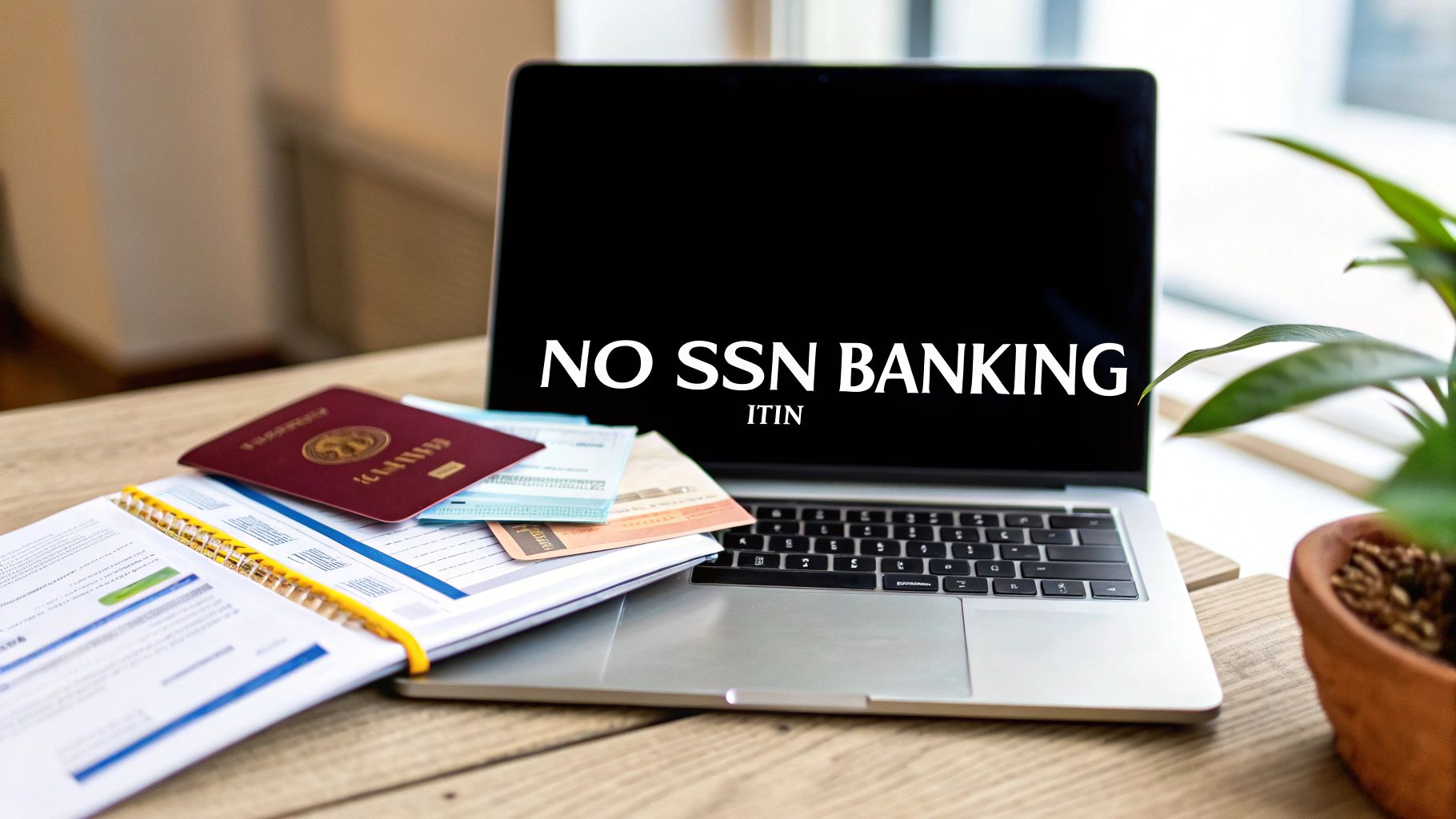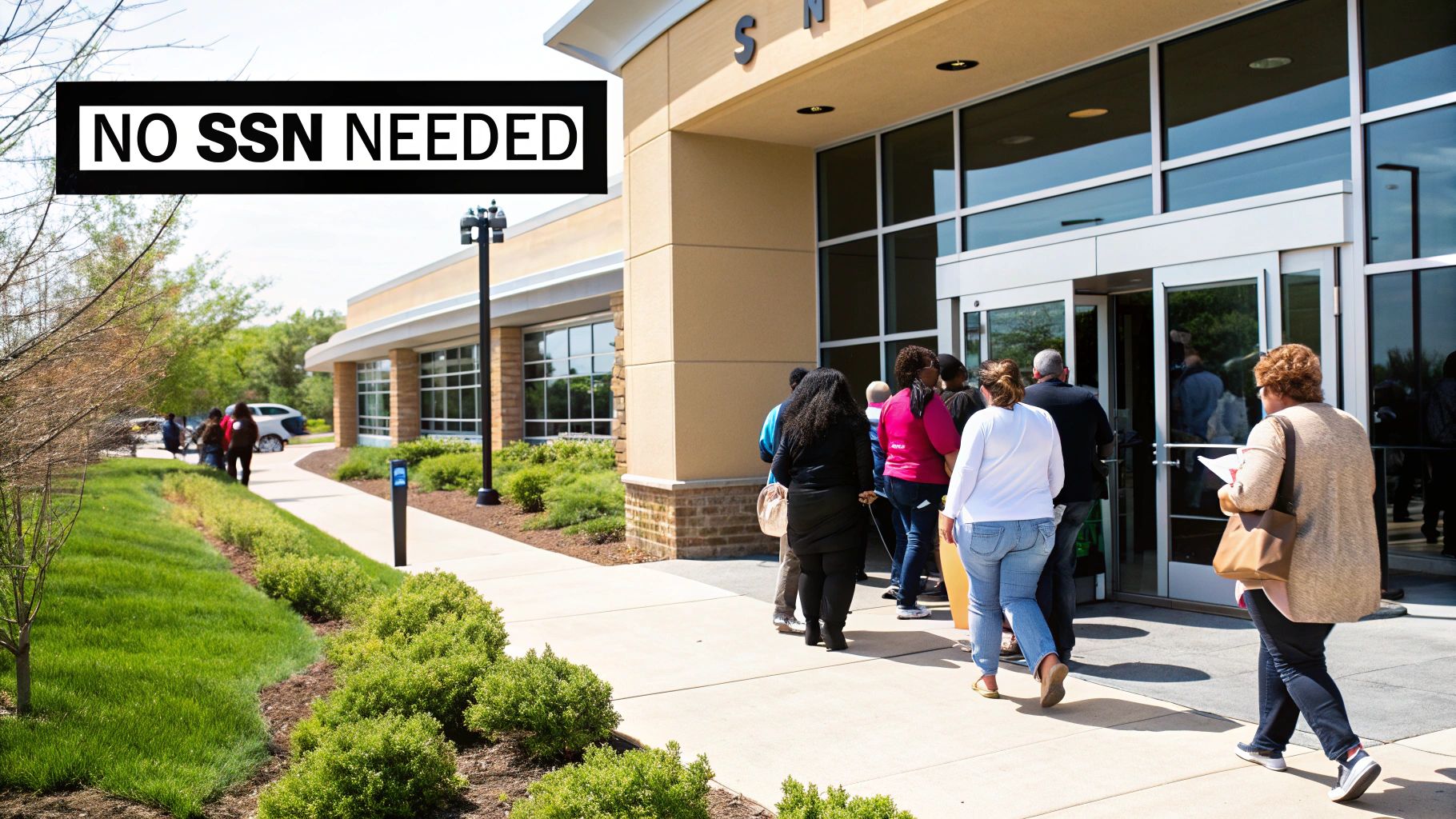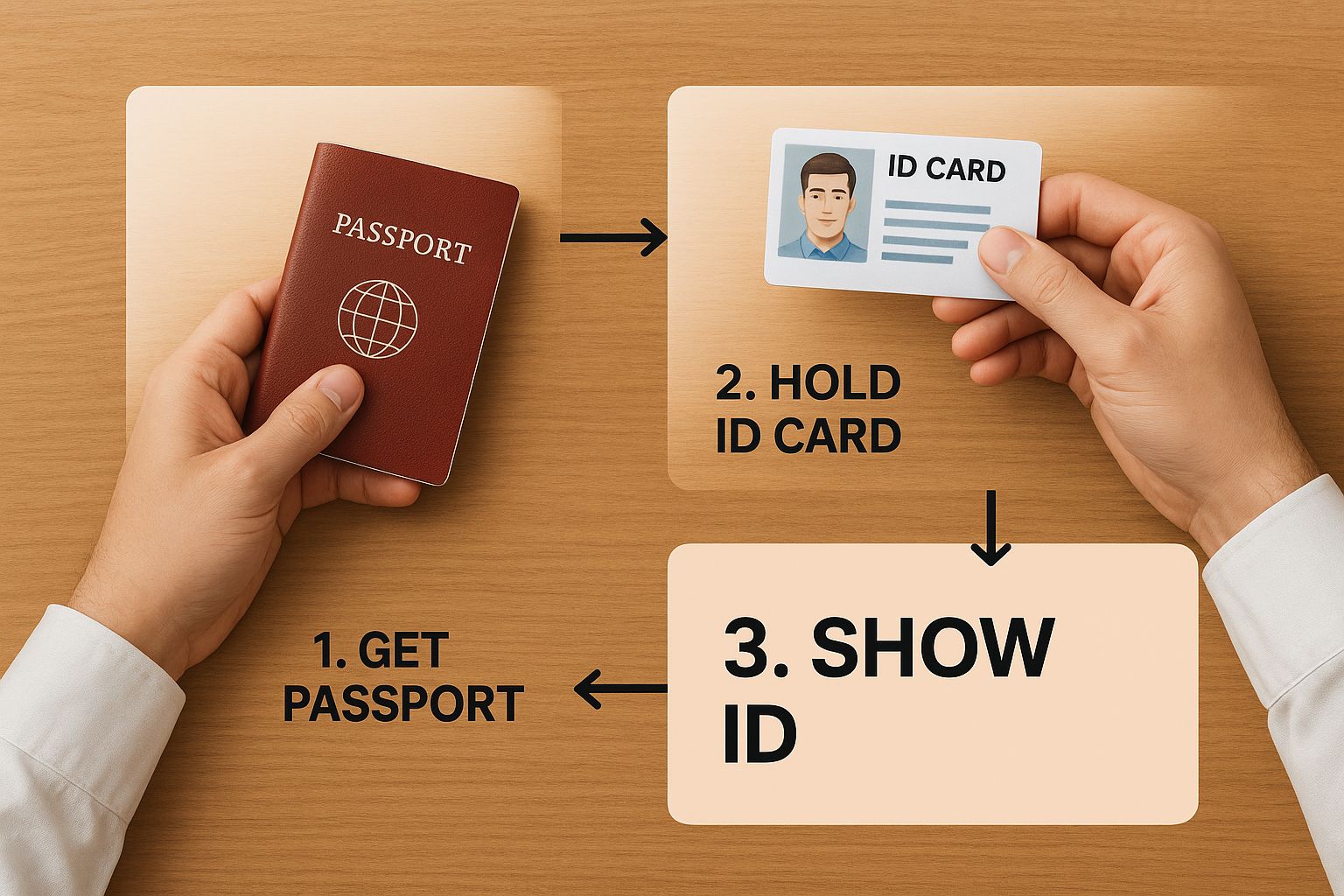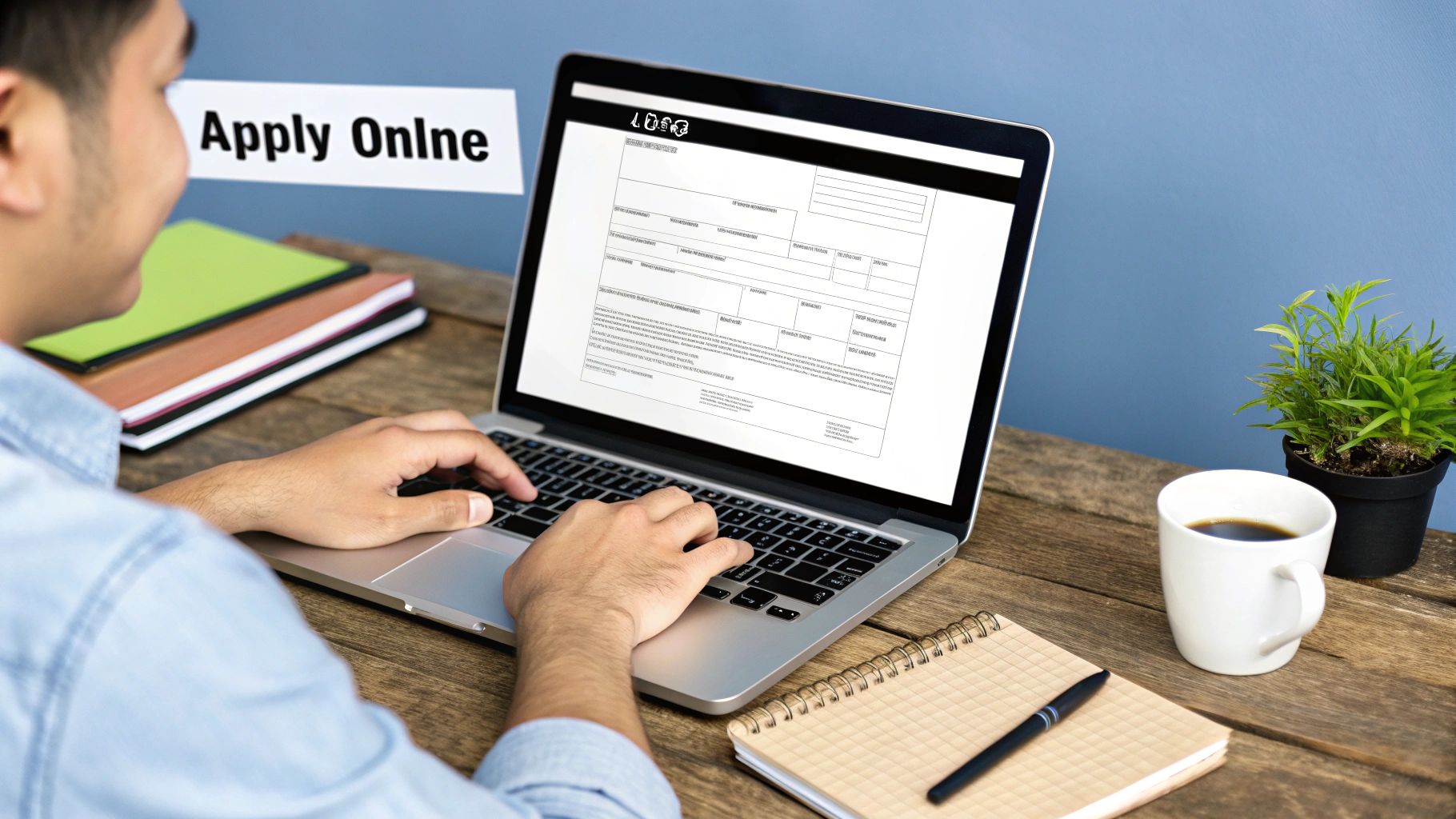Open a Bank Account Without SSN – Easy Guide

Let's clear up one of the biggest myths about American banking: you absolutely can open a bank account without a Social Security Number. It's a question I hear all the time, and the good news is that many banks and credit unions have well-established procedures for non-citizens, international students, and new residents to get banked.
The most common and effective alternative to an SSN is the Individual Taxpayer Identification Number (ITIN).
Your Path to Banking Without an SSN

The idea that an SSN is mandatory is a surprisingly stubborn misconception. In reality, U.S. law simply requires banks to verify a customer's identity—and an SSN is just one of many ways to do that. For anyone not eligible for an SSN, your ITIN is your golden ticket.
This isn't just a local issue. Access to banking is a massive global challenge. In fact, a 2021 report highlighted that an estimated 2 billion adults worldwide don't have a bank account, which severely limits their ability to save money and build a secure financial future. You can read more about these global financial inclusion efforts on gfmag.com. Thankfully, many U.S. financial institutions are aware of this gap and have created specific, welcoming processes for applicants using alternative identification.
What You Really Need
So, what does this actually look like for you? It all comes down to having the right paperwork ready. Banks are legally required to confirm two basic things: who you are and where you live. An ITIN paired with a valid government-issued photo ID is the combination that works best in most situations.
To make this process as smooth as possible, you’ll need to prepare your documents ahead of time. I always tell people to think in terms of proving your identity, your address, and your taxpayer status.
Document Checklist for Banking Without an SSN
Having your documents in order before you walk into a branch can make all the difference. This table breaks down what you'll almost certainly need, along with other documents that can help strengthen your application.
Gathering these items will show the bank you are prepared and meet their identity verification requirements.
When you walk into a bank with these documents in hand, you're not asking for a special favor. You're following an established and legitimate procedure for opening a bank account without an SSN. You'll be approaching the conversation with confidence, ready to get started.
The ITIN: Your Best Alternative to an SSN
If you need to open a bank account but don't have a Social Security Number, your most powerful tool is the Individual Taxpayer Identification Number, or ITIN. This is a tax processing number issued directly by the Internal Revenue Service (IRS). It was created for people who need a U.S. taxpayer ID but aren't eligible to get an SSN.
For a bank, an ITIN works almost exactly like an SSN. It officially identifies you within the U.S. financial system, showing that you're registered with the IRS. This gives financial institutions the proof of identity they need to comply with their own strict regulations.
Who Actually Qualifies for an ITIN?
So, who can get one? The IRS issues ITINs regardless of your immigration status. The main requirement is that you have a U.S. tax filing obligation but are not eligible for an SSN.
You'll likely need an ITIN in a few common situations:
The bottom line is this: if you have a legitimate reason to file taxes here but can't get an SSN, the ITIN was made for you. It separates your ability to bank from your work or immigration status, focusing purely on your identity as a taxpayer.
To get an ITIN, you'll need to submit Form W-7, Application for IRS Individual Taxpayer Identification Number, to the IRS. You typically send this in with your federal income tax return and documents proving your identity. While it might sound a bit intimidating, it's a very established process. Many large banks, including Bank of America and Wells Fargo, are already well-equipped to accept an ITIN. Just be sure to plan ahead—the typical processing time for an ITIN application is about seven weeks. For more specifics, you can find additional details on this process at dsgpay.com.
How an ITIN Opens Financial Doors
Once that ITIN is in your hands, it's so much more than just a number for tax forms. It’s your ticket to building a financial life in the United States.
It’s not just about opening a simple checking or savings account. An ITIN allows you to apply for other crucial financial products. For instance, you can finally start building a credit history, which is essential for getting loans, credit cards, and better interest rates down the road.
This is a huge step toward long-term financial stability and independence. A solid credit profile affects nearly everything, from renting an apartment to financing a car. It’s a journey, and you can learn more about how to build a credit score without a Social Security Number in our detailed guide. Tackling the ITIN application is your first, most impactful step.
Putting Your Paperwork Together
Once you have your ITIN or are ready with another set of accepted documents, it's time to build your application package. Think of it like this: you're collecting all the evidence a bank needs to confidently verify who you are and where you live. Walking into a branch prepared can make all the difference, turning a potentially stressful encounter into a smooth, successful one.
At the end of the day, your application needs to do two things: prove your identity and prove your address. Every single bank is required by law to check both.

The image above really gets to the heart of it—having your official ID and passport physically in your hands is the crucial first step when you arrive at the bank.
Your Core Identification Documents
For your primary ID, you absolutely must have a government-issued photo identification. This is non-negotiable. Your best bet is to use documents that are internationally recognized and difficult to fake.
Here are the heavy hitters:
My advice? Bring more than one of these if you can. You never know when a bank might have a specific internal rule, and having a backup can save the day.
Proving Your U.S. Address
After you've proven who you are, you have to prove where you live. This is where people often get tripped up, but you probably have more options than you realize. The bank just needs to see an official document with your name and current U.S. address printed on it.
Think about a common scenario: an international student in a university dorm. You likely don't have a utility bill in your name. That's fine! Official mail from your university, like an enrollment letter or a housing statement listing your dorm address, is perfect for this.
For a freelancer who just moved to the U.S., a signed lease agreement is a fantastic option. Even if you moved in yesterday, that formal rental contract with your name and address is powerful proof.
Many financial institutions have actually changed their policies to serve new residents better. They often accept a wider range of documents, which is a huge help for opening a checking or savings account and not having to rely on cash. You can find more details about these flexible banking requirements on NerdWallet.com.
Finding the Right Bank or Credit Union

Here’s something you need to understand right away: not every financial institution handles applications from non-SSN holders the same. It's a critical point. While the law allows for alternatives like an ITIN, individual bank policies can be all over the map. This makes your choice of where to bank one of the most important decisions you'll make.
The key is to target institutions known for being flexible and welcoming to newcomers. Honestly, it just saves you a ton of time and frustration. You'll want to focus your search on two main camps: large national banks with established ITIN programs and smaller, community-focused institutions.
Major National Banks That Welcome ITIN Holders
Big-name national banks are often a solid place to start. Why? Because they tend to have standardized, company-wide policies for ITIN applications. This consistency is a huge plus—it means if one branch in California accepts ITINs, another one in New York likely will, too. Banks like Bank of America, Chase, and Wells Fargo have been working with ITIN holders for years.
Since they operate on such a massive scale, they’ve already built clear internal procedures for verifying identity with alternative documents. In my experience, this means their staff are often better trained to handle your application without giving you a blank stare or causing unnecessary delays. For a more detailed look, our guide on banks that accept ITIN numbers breaks down a list of options and what to expect from each.
Even so, it's always a smart move to call a specific branch before you head over. A simple question like, "Hi, I'd like to open a checking account using my ITIN and foreign passport. Is that something your branch handles?" can save you a wasted trip.
The Advantage of Local Banks and Credit Unions
While the big banks offer predictability, don't sleep on the power of local community banks and credit unions. These smaller players often bring a level of personal service and flexibility that their larger competitors just can't match.
Credit unions, especially, are member-owned nonprofits that exist to serve their specific community. This mission-driven approach often makes them more willing to look at your situation on a case-by-case basis. If you can build a real relationship with a banker at a local institution, they’re much more likely to help you navigate the requirements.
Their requirements might be a little different, but they still need to verify your identity and address. The real advantage here is that you're more likely to be talking to a decision-maker who can personally review your documents and give you the green light.
Comparing Banking Options Without an SSN
So, should you go with a huge national bank or a small local institution? It really boils down to your personal priorities. To help you weigh the pros and cons, I've put together a quick comparison of what you can generally expect when you're trying to open a bank account without an SSN.
Comparing Banking Options Without an SSN
Ultimately, the best choice is the institution that makes you feel welcome and offers the services you actually need. Do a little research, make a few phone calls, and pick the financial partner that feels right for your new life in the U.S.
Tapping into Online and Fintech Banking
If you've hit a wall with traditional brick-and-mortar banks, don't worry. A new generation of financial technology—or "fintech"—companies has completely changed the game, making it much easier to open a US dollar account. These online services are often far more flexible and can be your best bet for securing a bank account without SSN requirements, especially if you need to get things sorted out from abroad.
These digital-first platforms operate almost entirely online, usually through a slick mobile app or website. This means you can often open an account from just about anywhere in the world. Their entire business is built around accessibility, and they're known for slashing the red tape that often bogs down the big, established banks. For someone just arriving in the U.S., this is a breath of fresh air.
So, How Do These Digital Banks Actually Work?
It's important to understand that fintech companies like Wise (you might remember them as TransferWise) and Revolut aren't quite the same as a chartered U.S. bank. They operate as money service businesses, and they are brilliant at what they do: holding multiple currencies, processing international transfers for cheap, and giving you a debit card for your daily spending.
Getting started is surprisingly straightforward. The biggest difference you'll notice is that you can typically verify your identity using documents from your home country, a hurdle that often stops people at traditional U.S. banks.
You'll usually be asked for one of these:
The verification process itself is incredibly modern. You'll likely just use your phone's camera to snap a picture of your documents and take a quick selfie to confirm it's really you. I've seen people get through this entire process in a matter of minutes.
The Real-World Advantages of Going Digital
Convenience is, without a doubt, the number one reason people turn to fintech. Imagine having a functional US dollar account and routing number set up before you even land in the United States. This lets you hit the ground running—you can receive money from back home, pay for your rental deposit, and manage your immediate expenses without any hassle.
Cost is another huge win. Fintech platforms are known for their crystal-clear, low-fee models, especially when it comes to sending money internationally. They typically charge just a tiny fraction of what a traditional bank would for a wire transfer, which can save you a serious amount of cash if you're managing finances across two or more countries.
But it's crucial to know their limits. Most of these services aren't FDIC-insured in the same way a U.S. bank is. While they have other safeguarding measures to protect your funds, it's a different kind of security. Also, these accounts are built for spending and transferring, not for building your U.S. financial footprint. They won't help you build a credit history, which is absolutely vital down the line for things like getting a car loan or a mortgage.
For most people, the smartest strategy is a two-pronged approach: use a fintech service for your immediate needs and the convenience, while you work on opening an account with an ITIN-friendly bank or credit union to build your long-term financial foundation in the U.S.
Got Questions About Banking Without an SSN? We've Got Answers
When you're trying to set up a bank account without a Social Security Number, it's natural to have a lot of questions. Getting clear answers is the first step to feeling confident and making progress. Let's walk through some of the most common concerns I hear from people in your exact situation.
A question that comes up all the time is, "Can I really just use my passport to open an account?" The short answer is yes, but it's only half the story. A valid foreign passport is a great piece of primary identification, but banks will also need to see proof of your U.S. address and, almost always, an Individual Taxpayer Identification Number (ITIN). A passport by itself just isn't enough to get the job done.
Will This Affect My Immigration Status?
This is a big one, and it causes a lot of anxiety. Let me put your mind at ease: opening a bank account will not affect your immigration status. Banks are financial businesses, not an arm of immigration enforcement. Their only legal duty here, under the Bank Secrecy Act, is to confirm you are who you say you are. This is standard procedure to prevent fraud and money laundering.
Your personal banking is kept private and completely separate from any immigration proceedings. The details you provide are used for one thing and one thing only: opening your account and handling any necessary tax reporting.
Understanding this separation is key. It empowers you to build a financial footprint in the U.S. without fear. In the long run, having an established banking history can actually be a good thing, as it helps demonstrate financial stability.
What if My Application Gets Rejected?
It’s definitely frustrating to have an application denied, but it's not the end of the road. If a bank says no, the first thing you should do is politely ask for the specific reason why. It could be something minor, like one of your documents not meeting their exact requirements, or you might have just spoken with a teller who isn't trained on ITIN applications.
Don't get into an argument; just collect the information. Then, move on and try a different bank. A rejection from one branch doesn't mean you'll be turned down everywhere. Major national banks with clear ITIN policies or local credit unions known for being immigrant-friendly are often a much better bet. It also helps to build up other financial proof. For example, understanding your ITIN credit report can show you how other financial activities are being recorded, which can add to your overall profile.
Are Online-Only Banks a Safe Choice?
Digital banks and fintech apps can be incredibly useful, especially when you need to get something set up quickly. For the most part, they are safe and regulated as money service businesses, offering solid security for your money. However, being "safe" also means understanding what they are—and are not—good for.
They're fantastic for everyday spending, sending money internationally, and managing your cash. The downside? They typically don't report your activity to the major U.S. credit bureaus. This means they won't help you build the U.S. credit history you'll need down the line for things like car loans or a mortgage.
The smartest strategy is often to use both: an online-only account for daily convenience and a traditional bank or credit union to build your long-term financial health.